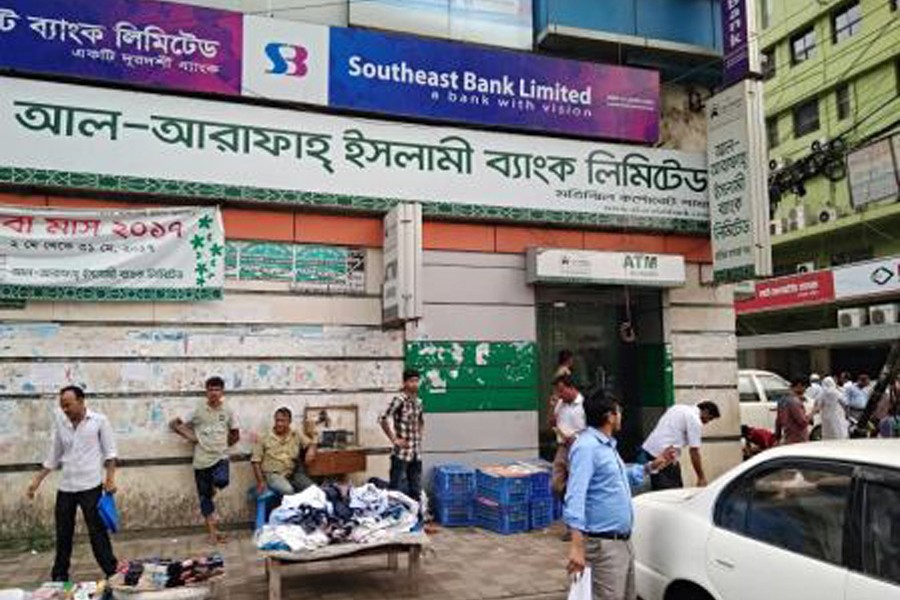Once a customer asked a young banker what priority of a bank should be while fixing the price of a loan. Rate of return of the bank itself, or that of the business firm aspiring to grow with credit support? A puzzling question, indeed!
A bank, as a business entity, would definitely try to maximise its rate of return. It may also extend credit at lower price since such sacrifice can produce better yields for it in the long run. Banks are actually entrusted with the task of allocating efficiently the scarce capital for firms that generate the highest returns.
As the world has been battered by a single devastating incident called coronavirus outbreak, Bangladesh's banking sector has experienced the heat of two troubling forces simultaneously: the Covid-19 effects and the forced lower rates of interest. While the coronavirus is slashing life expectancy of people, the officially pegged rates are chopping the profit margin of the banking industry.
Bankers cannot hide their dejected faces even from the clients, who can easily find the reason of the former's anxiety. The brunt of the declining profit would be borne by them, the bankers fear.
It is evident that banks of Bangladesh love to make profit. The market has already been saturated, but the hunger for launching new banks is yet to be satiated. It's not that industrialists are earning less in other sectors; still they eye big bucks from banks.
However, there is no significant amount left for shareholders after a significant portion is surrendered to the exchequer. A sharp fall in operating profit (often to more than half) has been recorded due to provisioning. A high rate of tax eats into the remaining figure. In the end, the shareholders have to be content with a figure derived after meeting a handsome amount of regulatory reserve requirement.
The high tax on banks may be attributed to 'consistently healthy sector proven to be able to pay higher tax'. In fact, banks are good taxpayers. So, they are taxed or axed more - what an economic rationale! We know the ramifications of such taxation in the recent past. Banks are falling and taxpayers' money is being used to bail them out. So, the excessive tax is returning to the banks. Such safety package has obviously failed to revive the bank, except exposing an ailing structure or a ghostly appearance.
Now the question is: Will the banks be able to retain their profit-making habit despite the corona storm and challenge of single digit rate without hurting the stakeholders?
The shareholders are worried that their dividends will be trimmed. The employees fear their benefits will be curtailed. The regulators apprehend that classified loan will surge due to indiscriminate lending spree by banks to offset the losses caused by diminishing spread of interest rates (gap between lending and deposit rates).
However, banks can still make profit without hurting anybody. How?
Firstly, the government expects a business growth by giving a single rate therapy. As such, the taxmen are expected to generate additional revenue from businesses. So, the government can afford to earn less from banks by generating higher amount of revenue from other businesses.
One may ask what would happen to the growth dream of the exchequer, if the single digit rate keeps its revenue in the same range. A simple answer to such query is: It's not an imperative for the government to always make profit from its measures.
Moreover, if the single digit rate gives birth to more businesses by attaining the policymakers' objective, the barn of the exchequer will be filled with 'goldcoins' in the long run. Dependence of earning revenue from the real business sector instead of an intermediary will certainly enhance strength of the treasury.
Secondly, a bank can recoup the lost margin through adopting cutting edge technology. We are hearing about emergence of Neobank shortly, which will make the establishment of traditional bank branches irrelevant. Experts say the ongoing technological shift, often termed as Fourth Industrial Revolution, won't curtain jobs. Automation in the banking industry may rather create jobs through the process of reskilling the workforce.
Thirdly, financial inclusion might be a game changer in the age of marginalised profit for banks. Around one-third of the Bangladeshi households are yet to have access to either banks or other financial institutions. According to 'The Global Findex Database 2017', only 50 per cent Bangladeshis aged above 15 years maintain a bank account.
So, a sea of opportunities remains open to sail across. Already 'Agent Banking' is doing a miracle. A 2020 Bangladesh Bank report said twenty three banks in the country have opened around 7.35 million accounts through 12,449 outlets. By this time, agent outlets have collected deposits worth Tk 10,2.20 billion and disbursed loans amounting to nearly Tk 7.21 billion.
Yet, the banks might not be able to keep profit from falling in the short run. The stakeholders might need to wait a little bit while they can set themselves to new orientation. After all, a bank is a service organisation aiming at developing entrepreneurship and making economic emancipation of a country.
Having a bank account is considered the sixth basic human right today. If a bank can concentrate on its own business, which is meant for serving other businesses without hurting their heart, it is likely to accomplish its goal of making the stakeholders happy.
Mohammad Kazi Mamun is AVP and Head of Branch at a private commercial bank.


